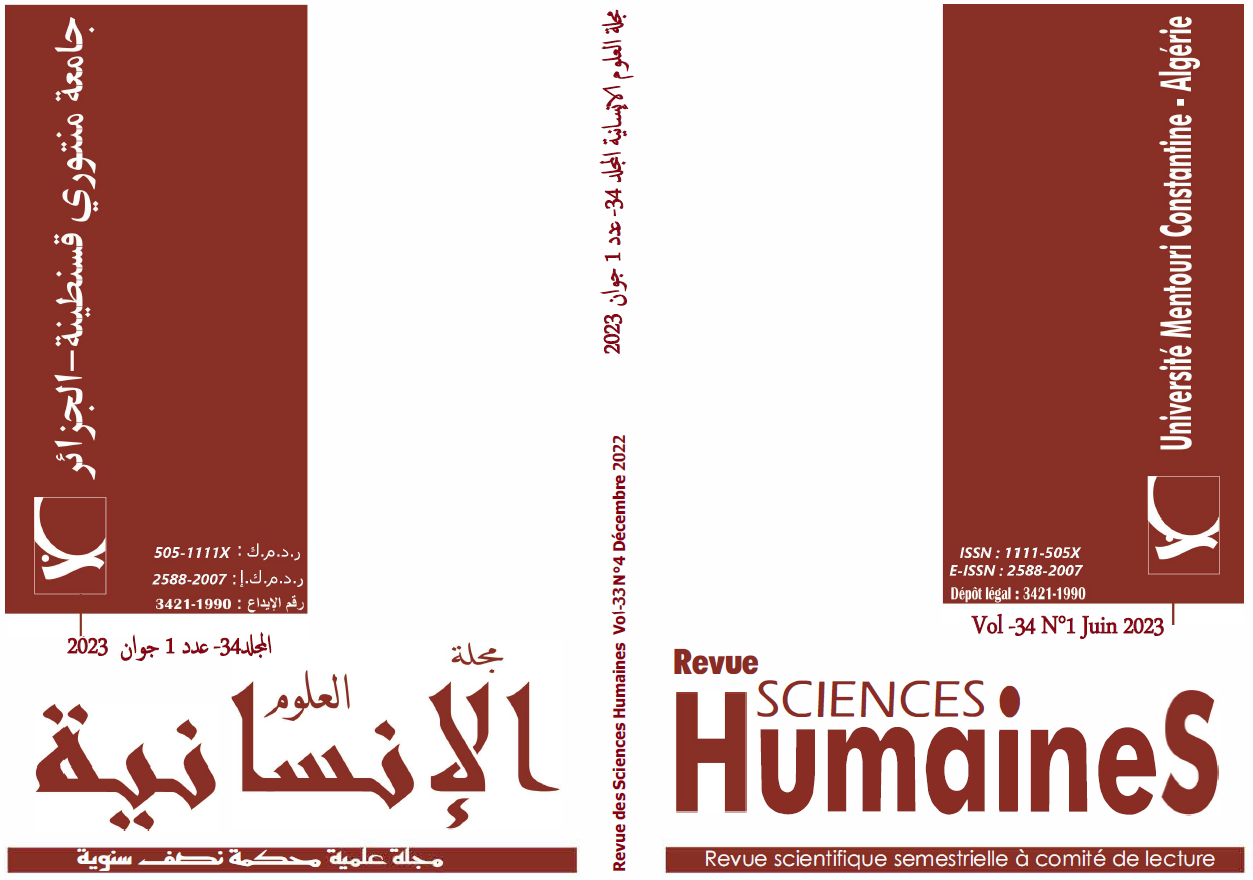Towards innovative public organizations: analyzing the e-government strategy in Demark and Algeria
Keywords:
society, e-government, ICT, e-Algeria, Danish experienceAbstract
The socio-economic society has undergone various unprecedented changes with the event of globalization, it marked by an enormous entry of technology into every aspect of everyday life; this has changed how people live, how companies deal with business and how governments satisfy citizen’s needs, so the use of ICTs can connect all three parties. In fact, most countries adopt policies that emphasize the use of these information and communication technologies in order to achieve better Electronic Government, consequently to increase citizen adoption and usage of their online government services. This paper aims to highlight the e-Government strategy in both developing and developed countries, taking the e-Algeria and the Danish experience as case studies.
Downloads
References
Books :
• Translatedaccording to : Alain Ambrosi, Valérie Peugeot and Daniel Pimienta , (2005), « Enjeux de mots : regards multiculturels sur les sociétés de l’information », C & F Éditions.
Journal article :
• Alok Kumar Mittal, Pradeep Kumar Kalampukatt, (2010), “Partnership challenges in achieving common goals – A study of Public Private Partnership in e-Governance projects”, Master Program in Strategic Project Management (European),Umeå School of Business, Sweden, p.14
• Christian Wagner, Karen Cheung, Fion Lee, Rachael Ip, (2003), “Enhancing E-government in Developing Countries: Managing Knowledge through Virtual Communities”, The Electronic Journal on Information Systems in Developing Countries, 14, 4, pp.14-16
• Djilali IDOUGHI, Djeddi ABDELHAKIM, (2013), “Towards an Algerian e-Government strategy and achievements”, international journal of e-business and e-government studies Vol 5, No 1, p.89
• Donna Evans, David C. Yen, (2006), “E-Government: Evolving relationship of citizens and government, domestic, and international development”, Government Information Quarterly 23, pp.209-228
• France Bélanger, Lemuria Carter, (2008), “Trust and risk in e-government adoption”, Journal of Strategic Information Systems 17, pp.165-174
• Gerald Grant, Derek Chau, (2005), “Developing a Generic Framework for E-Government”, Journal of Global Information Management, 13(1), p.03
• Mete Yildiz (2007), “E-government research: Reviewing the literature, limitations, and ways forward”, Government Information Quarterly 24, pp.654-656
• Olaniyi Evans, (2019), “Digital government; ICT and public sector management in Africa”, chapter 4 in Financial legal and IT aspects of management, p.271
• Peter Drucker, (1969), “The Age of Discontinuity. Guidelines to Our Changing Society”, New York, Harper and Row.
• Sara Abdallah, Ip-Shing Fan, 2012, Framework for e-government assessment in developing countries: case study from Sudan”, Electronic Government, An International Journal, Vol. 9, No. 2, p.159
• Shailendra C. Jain Palvia, Sushil S. Sharma, “E-Government and E-Governance: Definitions/Domain Framework and Status around the World”, Foundations of E-government, pp.01-04
• Shareef M. Shareef,Hamid Jahankhani, Mohammad Dastbaz, (2012), “E-Government stage model: Based on citizen-centric approach in regional government in developing countries”, International Journal of Electronic Commerce Studies Vol.3, No.1, p.148
• SubhajitBasu (2004): E‐government and developing countries: an overview, International Review of Law, Computers & Technology, 18:1, pp.110-112
• Thomas Barnebeck Andersen, (2009), “E-Government as an anti-corruption strategy”, Information Economics and Policy 21, p.209
• Vinod Kumar, BhaskerMukerji, Irfan Butt, Ajax Persaud, (2007), “Factors for Successful e-Government Adoption: a Conceptual Framework”, Electronic Journal of e-Government Volume 5 Issue 1, pp.68-73
• Zhiyuan Fang, (2002), “E-Government in Digital Era: Concept, Practice, and Development” , International Journal of The Computer, The Internet and Management, Vol. 10, No.2, pp.05-07
Reports:
• The report of Global corruption report (2003), p.30: https://www.transparency.org/whatwedo/publication/global_corruption_report_2003_access_to_information consulted on 17/04/2020
• World Public Sector Report, 2003, pp.158-187: https://publicadministration.un.org/publications/content/PDFs/E-Library%20Archives/World%20Public%20Sector%20Report%20series/World%20Public%20Sector%20Report.2003.pdf consulted on 18/04/2020
• The report of: UNESCO, (2005), "Towards Knowledge Societies", p.27: http://unesdoc.unesco.org/images/0014/001419/141907f.pdf translated and consulted on 02/09/2018
• The report of : e-Commison , (2008), synthesis e-Algeria, Embassy of Algeria in Moscow: http://www.algerianembassy.ru/pdf/e-algerie2013.pdf
• The e-Government survey, 2014: https://publicadministration.un.org/publications/content/PDFs/UN%20E-Government%20Survey%202014.pdf consulted on 20/04/2020
• The e-Government survey, 2016: https://www.egovernment.ch/files/3414/7031/5638/UN-eGov-Survey-2016.pdf consulted on 20/04/2020
• E-Government Survey, 2018: https://www.unescap.org/sites/default/files/E-Government%20Survey%202018_FINAL.pdf consulted on 20/04/2020
• The report of Ministry of Post, Telecommunications, Technology and Digital, General Direction of Digital Economy, p.11: https://www.mpttn.gov.dz/sites/default/files/Fr-Rapport-TIC%20.pdf
• The European Union, (2015), Article 2 of Commission Directive 80/723 / EEC of 25 June 1980 on the transparency of financial relations between Member States and public enterprises
Internet websites:
• https://www.academia.edu/33458693/Cours_de_management_des_entreprises consulted on 19/05/2019
• https://www.mpttn.gov.dz/en/content/ict-indicators consulted on 05/09/2019
• Ministry of Post, Telecommunications, Technologies and Digitalization https://www.mpttn.gov.dz/en/content/e-gov consulted on 20/05/2019
• https://link.springer.com/article/10.1057/s41265-016-0022-6 consulted on 20/05/2019
• https://www.oecd-ilibrary.org/docserver/9789264061651-33-en.pdf?expires=1587387840&id=id&accname=guest&checksum=C3AFCE472C41D293A309D2E43F35216E consulted on 20/04/2020
Downloads
Published
Issue
Section
License
Copyright (c) 2023 Human Sciences Journal

This work is licensed under a Creative Commons Attribution-NonCommercial-NoDerivatives 4.0 International License.












